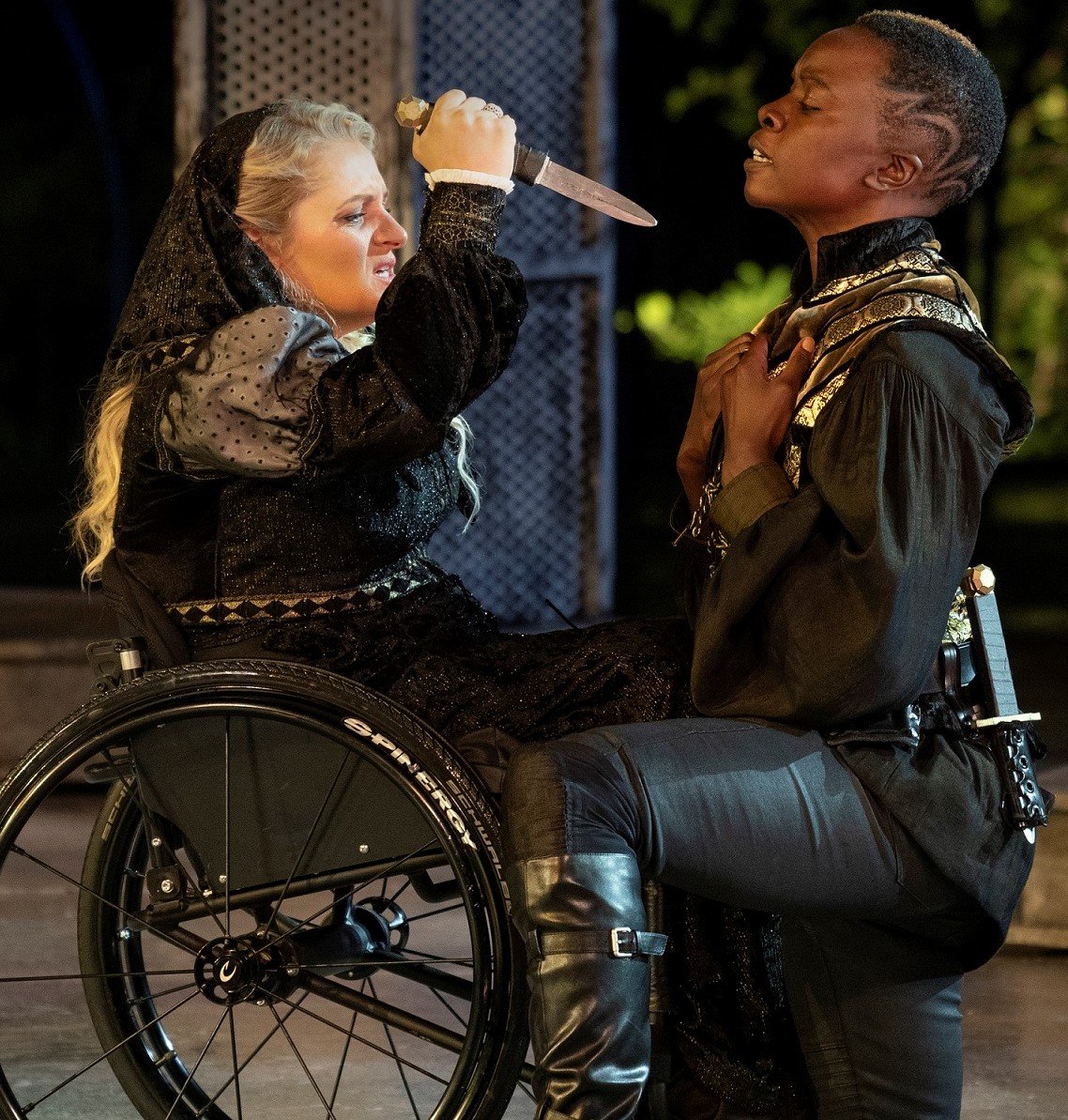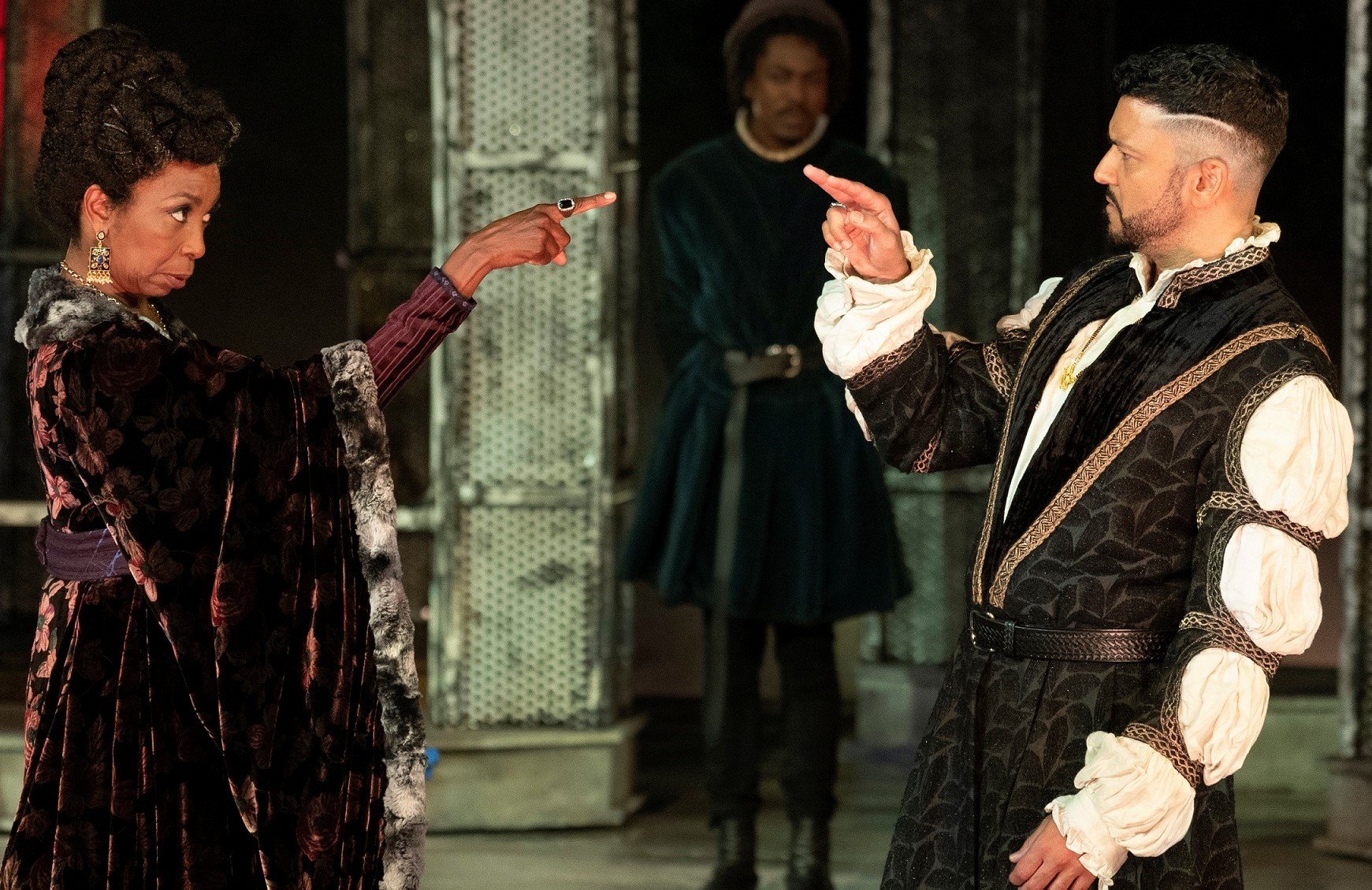Richard III (Danai Gurira) tempts the murderer Tyrrel (Matthew August Jeffers) to kill the Princes in the Tower in the Free Shakespeare in the Park production of Richard III.
In William Shakespeare’s Richard III, the title character is a hunchback whose anger is fueled because he feels like an outcast. His quest for power becomes a form of revenge. Under Robert O’Hara’s direction, Richard III for the Public Theater is loose and playful. Actress Danai Gurira, in the gender-swapped title role, is sinewy and tiger-like. As Richard, she pounces, manipulates, smiles, grins, and grimaces: a shape-shifter who manipulates others.
In Act I, Richard immediately sets to his task of murdering anyone who stands in his way to becoming king. First, he kills King Henry VI and then Henry’s son, Prince Edward. Then Richard sets his sites on Edward’s widow, Anne (Ali Stoker). Her initial response to Richard sums up the way generations have come to view him:
Foul devil, for God’s sake, hence, and trouble us not;
If thou delight to view thy heinous deeds,
Behold this pattern of thy butcheries.
Gurira as Richard tries to woo Ali Stroker as Lady Anne, whose husband he has killed.
But soon Anne bends to his cooing and cajoling and agrees to marry him. For him, every alliance is an important stepping-stone in his quest for kingship. His “butchery” is only a means for this.
The norms of Richard’s character are challenged by O’Hara’s casting. As Richard, Gurira is muscular, but not masculine. While cross-gender casting is nothing new—Shakespearean actors played all roles, including female ones—there is gender discord between text and actor. Richard’s misogyny on a woman’s tongue feels complicated in a way that no amount of suspension of disbelief can deny.
Theater today is more inclusive than ever. As a result, there are questions about whether a character with a disability should be played by an actor without one. O’Hara avoids addressing this altogether. Here, Richard does not have a disability, nor is he played by an actor with a disability, yet there are several actors in the production who do have disabilities. If Richard is not visibly “othered,” his source of rage is unclear.
How actors work with Shakespeare’s language is also as diversified as the cast itself. Some actors, such as Michael Potts as Lord Stanley and Sharon Washington as Queen Margaret, and even Matthew August Jeffers as the hired killer Tyrrel, deliver the Shakespearean text with ease and dexterity. Others, such as Stoker, deliver their lines in a flat, nasally tone: Shakespeare with a New York accent. Gurira handles the text very well, although when Richard is angry or excited, her tone goes up in pitch and volume and makes her Richard less commanding.
“How actors work with Shakespeare’s language is also as diversified as the cast itself. ”
The Elizabethan period costumes by Dede Ayite are sumptuous and beautiful. They hearken to the era in her use of satin and velvet, and are stylistically reflective of the time (capes, doublets, long flowing dresses trimmed with fur, knee length trousers) with an avant-garde twist. Think Renaissance meets Mad Max. The original music and sound design (Elisheba Ittoop) give the production a needed weight with a soundscape (a blend of beatbox and industrial) that underscores the terrifying nature of the play’s story. The set design (Myung Hee Cho) utilizes simple, steel arches that zip around in a circular motion like a carousel to change scenes and mood. The ascending and descending platform, like an elevator in the middle of the stage, effectively transitions actors on and off stage and keeps the pace moving.
Sharon Washington (left) plays the formidable Queen Margaret, and Sanjit De Silva is Buckingham. Photographs by Joan Marcus.
As the play progresses, Richard grows more power-hungry and turns on those who have helped him get to the throne. The biggest tragedy is the betrayal of his good friend Lord Buckingham (the eloquent and earthy Sanjit De Silva), whom he sends to his death. Richard’s mother, the Duchess of York (played by Monique Holt, a deaf actor who is often accompanied by another actor who translates the ASL into spoken words), grows frustrated with him. As her conversation grows more urgent, so does her signing. Even though her signing is not translated for the audience at a crucial moment, the physicalized expression of ASL makes her anger apparent.
There is wry humor in Richard III, but O’Hara has wrestled more humor out of the play than tragedy. When Bertolt Brecht said, “Art is not a mirror held up to reality but a hammer with which to shape it,” he was asking that theater not be a place to escape reality, but to confront it. In the end, the impact and reality of Richard’s bloodthirsty tyranny, which is reflected on the world stage today, is lost without Brecht’s hammer.
The Public Theatre production of Richard III at the Delacorte Theatre in Central Park (entrance at 81st Street and Central Park West) runs through July 17 at 8 p.m. Tickets are free and can be accessed through the in-person distribution in Central Park; at the Public Theater; and in the boroughs. There is also a digital lottery with TodayTix and in-person standby in Central Park. Visit https://publictheater.org/productions/season/2122/sitp/richard-iii/ for more information.





